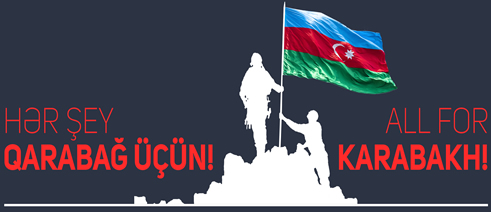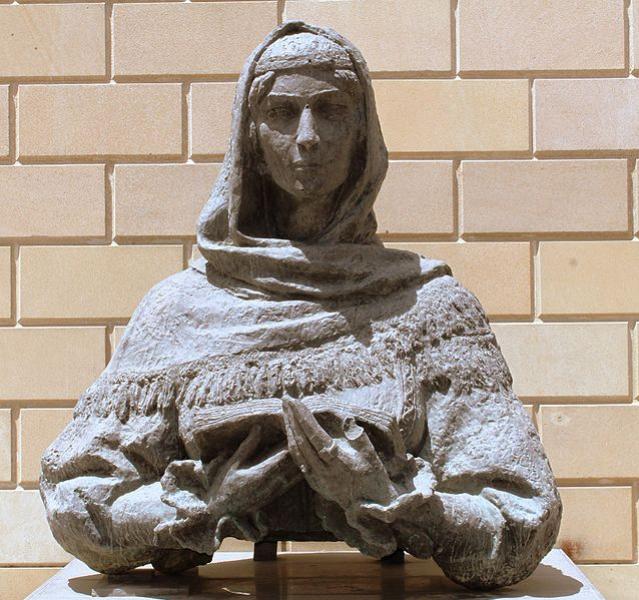


We can say followings about Karabakh literature of middle age and last middle ages. It is observed that onset, basis of Azerbaijan-turkish culture and literature is connected to Karabakh litrerary settings. First representative of written literature of Karabakh known to science, as a certain fact is Davdag as a poet of VII century.
The only piece of work remaining until now is poem in a translated version in the genre “agi” which was written to assasination of Albanian-Partav-Barda leader Javanshir by the order of armenian priests. The plot of that poem, idea-esthetic and style and devoting agi poem to the great leader and warlord as Javanshir proves that Davdag is stong and well-known poet of his time. Founders of arabic language Azerbaijan literature in X century Abu Bakir Ahraad al-Bardai, Makki ibn Ahmad Bardai, Khatib Bagdadi Mahammad Al-Bardai, Ahmad ibn al-Hüsayn Abu Said al Bardai, Abu Ali al-Bardai, Said ibn al-Gasim al Bardai, Abu Sad ibn Yahya al-Bardai (facts are taken from the book of M.Mahmudov “Azerbaijan poet and writers acting in arabic” (VII-XII) are prominent scholar and philosophers of not only in Azerbaijan but also of all Islamic world. In X-XI centuries eminent intelllectuals of muslim East - Said Amirul Bardayi, Mahammad Abdulla Bardayi lived in Karabakh. Karabakh poet of XI century Masud Namidar was famous for translating “Injil” into arabic, persian and turkish languages. One of the pronounced representatives of XII century of Azerbaijan poetry was Karabakhi Mujiraddin Beylaqani and Khosrov Dahlavi appreciated his activity higher than Khaqani Shirvani’s.
Zald ibn Huseyn ibn Omar Beylagani also was contemporary of Mujiraddin and reached the highest scientific degree, went to Damashq, became famous as a leading personality of literary thinking and pfilosophy, created litrerary pieces of work. Since XIII century the amount of writers and poets creating works in mother tongue is growing in Azerbaijan literature which was established in arabic and persian languages under influence of obvious historical reality. We can state “ Dastani-Ahmad Harami” poem as an example of epic poetry of XIII century. In this poem humanistic virtues of Islam is conveyed as literal subject and author invites reader to goodness, justice, humanism, honesty, conciousness, and faith and deviates him from negativ features. Unlike combative novels of middle ages, here the main purpose was not to make occurances appealing but to convey moral idea to the reader in an imppressive way. In XIV century Tuti Abdulla Karabakhi was acting and we have no work of him availaible but his name was mentioned in Hagigatus-shuara” and other sources. In XV century Kharabaglı Sheykh İbrahim ibn Mahammad Shəhabaddin Bardai was granted with title Sheykh and was well-known in literature with penname Gulshani. Yusiph ibn Mahammadshahi Karabakhi lived in XVI-XVII centuries, was one of the eminent scholars of his time, he went to Samargand to Huseyniiyya palace and reached level of Movlana Yusiph. All of these are the traits, values of our rich culture remaining till now from difficult times of the history. Karabakh litrery environment formulated Azerbaijan culture and literature and created the strongest pages and directed them. Karabakh literary environment of XVIII-XIX centuries was standing in valueable position with its idea-esthetic plot, literary-style tendencies and diversity not only in Azerbaijan but also in Turkish and Eastern literature.whiz of this art such as Ashig Gurbani from the palace of Shah Ismayil Khatayi, who lived and worked in XVI century and representatives of XVIII century Mirmohsun Lambarani Asaf, Ashıg Ali, Ashıg Valeh. Ziyadi Karabakhi and Molla Panah Vagiph are really reknown for their activities. Works of philosopher-writer of XVI century Mahammad Karabakhi are reserved in Qahira library.
XVI-XVII centuries are known as a formation period of love and hero epos in Azerbaijan literature. Achievements gained in written poetry are observed in Gurbani’s, Ashig Abbas Tupharganli activities. “Ashig Garib”, “Abbas and Gulgaz”, Asli and Karam” and other perfect love epos are formed in this period and they entered to the activity of folk writer and poets. Known from Shah Ismayil Khatayi’s activity goshma, garayli, varsagi, bayati are improved in this period.
In XVIII century after founding Shusha-Panahabad Karabakh literary environment turned to be blistering center of Azerbaijan literal – cultural environment and Karabakh khanate started to determine the direction of social-political events of Nakhchivan, Iravan, Ganja, Shaki and Georgia. There were created close ties among them and these ties enlarged influential sphere of Karabakh litrerary environment. Begining from XVIII century Karabakh litrerary environment founded first realistic poem and caused creation and improvement of XIX century literal realistic method. In XVII-XVIII centuries Azerbaijan literature became close to genuine life and folk language under the influence of works of ashigs and transition period to realism embarked in Azerbaijan poetry. New national poem school was established by Molla Panah Vagiph in Karabakh in XVIII century and improved by Gasim bey Zakir. Especially, Vagiph’s activity places exclusive role. He stridedfrom classic romantic art toward realism by creating simple, realistic, secular characters and identified development directions. Vagiph was also prominent political figure and leaded external policy of Karabakh khanate for a long time . XVIII century is charachterized as a last stage of middle ages and begining stage of new age in Azerbaijan literature. In XVIII century daughter of Karabakh khan Aga Beyim aga Tuti is famous as wisest in East and she was leading personality of Shah diplomacy during leadership of Gajar Phatali shah and her famous bayati is reknown till now with its heroism soul. The motherland of bayatis, important genre of folk literature was Karabakh lands. Perhaps, first bayati of turkish world was created here and for that reason bayati is prevelant in comparison with other regions. Bayati is one of the richest genres in Irag, Bagdad where Karkuk turks from Bayat generation are residing and bayatis of Karkuk turks are very well-known. It is obvious to everybody that genious poet of XVI century and of all periods Mahammad Fuzuli was also Bayats. As a Master in writing bayatis Sari Ashig is from the village Gulabird (Lachin region) of Karabakh. In XIX century Karabakh literature entered to “Golden age” and Shusha turned to be cultural center of Caucausus. Names of 100 writers and poets are mentioned in the work called “Tarkireyi – Navvab” of poet, painter, scholar Mir Mohsun Navvab. Poetess Khurshudbanu Natavan , Ashig Pari and authors of “ Karabakhname” Adıgozal bey, Mirza Jamal Javanshir, Mirza Mehdi Khazani, Ahmad bey Javanshir are eminent personalities of that time. In the begining of XIX century western tendencies in Karabakh culture and also in literature were strengthened after integration of Azerbaijan into Russian empire. Under its influence national and realist- secular motives became leading. Fuzuli’s traditions are preserved and continued in the activities of Zakir and his contemporaries and real example of it is Khurshud Banu Natavan. (1830-1897) . “Majlisi-uns” poetic meeting in Shusha was headed by Khurshud Banu Natavan and “Majlisi-faramushan” (meeting of forgetten people) was headed by Mirza Mohsun Navvab. There were close bonds among meetings and poets were in touch with each other. Totally, literature of XIX century paved the way for transition to XX century literature of Karabakh literal environment which is considered high-leveled stage of literature. Comedies written in the ends of XIX century by Najaf bey Vazirov (1854-1926), contunuing traditions of Akhundzade, tragedy “Musibeti-Phakhraddin” (1894) , comedies and tragedies of Abdurrahimbey Hagverdiyev enriched Azerbaijan literature. Karabakh brought up Ashig Pari who was first professional female ashig of Azerbaijan. It occured in the progressive joint period of written and folk literature. In the end of XIX and in the begining of XX centuries one of the most outstanding representatives of Karabakh cultural environment is genious composer, founder of first opera in the East, great writer, author of first liberetto, creator of musical comedy, journalist, publicist, and author of the hymn of Azerbaijan. Generally, we can list the most prominent representatives of Karabakh as following :
Yusif Vazir Chamanzaminli- author of first novels ( “Iki od arasinda” , “ Gizlar bulagi”), writer-ethnographist, folk investigator, diplomat.
Jeyhun bey Hajibeyli- writer, publicist diplomat, specialist in folklor (first time in Paris he published the book” Karabakh folk” in french and original texts;
Ahmad bey Aghayev – is one of the first great ideologists, writer and scholar, publicist journalist, founder of “ Difai”, first turkish national organization combating against armenian terrorizm;
Firudin bey Kocharli – first historian of literature, head of Gori and Gazakh teacher’s seminary;
Suleyman Sani Akhundov – one of the first authors of child literature, creator of the first groom character which encompassed all Azerbaijani mentality in “Lachin nest” drama and first writer-teacher who was granted with status National Hero ;
Abdurrahim bey Hagverdiyev – founder of historical drama genre, director of first opera and dirijor and authors of dramas “Yeyarsan gaz ətini, gorarsan lazzatini” (1892) and “Dagılan tiphaq” (1896) “Bakhtsiz javan” (1900) and “Pari-jadu” (1901) tragedies, “Marallarım”, “Khortdanın jahənnəm maktubları”, “Sheykh Shaban”, “Khayalat”, “Aj hariphlar”, "Aga Mahammad shzah Gajar" (1907)
Although these poets and writers were born in Karabakh and became idea masters of Azerbaijan literature and culture were appreciated as children of all turkish world.
Source:
www.karabakh.az
www.azerbaycanli.org